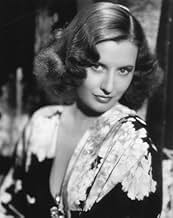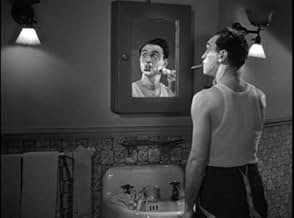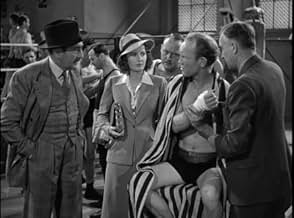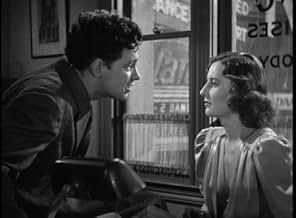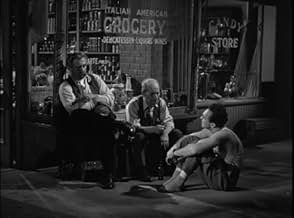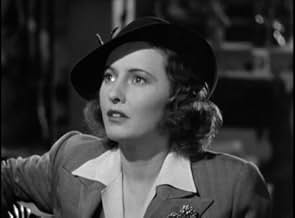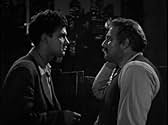CALIFICACIÓN DE IMDb
6.8/10
2.2 k
TU CALIFICACIÓN
Agrega una trama en tu idiomaA poor young Italian man, who is a virtuoso on the violin, wishes to become a champion boxer to make a fortune for his family. But what is the road to success and happiness, and what is the ... Leer todoA poor young Italian man, who is a virtuoso on the violin, wishes to become a champion boxer to make a fortune for his family. But what is the road to success and happiness, and what is the price?A poor young Italian man, who is a virtuoso on the violin, wishes to become a champion boxer to make a fortune for his family. But what is the road to success and happiness, and what is the price?
- Nominado a 1 premio Óscar
- 1 nominación en total
Edward Brophy
- Roxy Lewis
- (as Edward S. Brophy)
Charles Halton
- Newspaperman
- (escenas eliminadas)
Stanley Andrews
- Driscoll - Fight Official
- (sin créditos)
Gordon Armitage
- Fighter
- (sin créditos)
Earl Askam
- Policeman
- (sin créditos)
Don Brodie
- Reporter
- (sin créditos)
Mushy Callahan
- Fight fan
- (sin créditos)
Dora Clement
- Ill Ringsider Who Won't Leave
- (sin créditos)
Argumento
¿Sabías que…?
- TriviaWilliam Holden was so grateful to Barbara Stanwyck for her insistence on casting him in El conflicto de dos almas (1939), his first big role, that he reportedly sent her flowers every year on the anniversary of the first day of filming.
- ErroresJoe's chest is completely smooth during the big fight. Immediately after the fight, when he is dressed, he has chest hair visible at the top of his shirt.
- Citas
Eddie Fuseli: This your girl?
Lorna Moon: I'm my mother's girl.
- Versiones alternativasA video version in Argentina was lifted from a 16mm print from Columbia Pictures, in English with Spanish language subtitles. The credits of this version are translated in Spanish.
- ConexionesEdited into Head (1968)
- Bandas sonorasWe're in the Money Now
Sung a cappella by Adolphe Menjou to the tune of the traditional
nursery rhyme "The Farmer in the Dell"
Opinión destacada
The acclaimed play by Clifford Odets, Golden Boy, ran for 250 performances during the 1937-1938 season on Broadway and as Columbia had now pulled itself into the big leagues of studios in Hollywood, Harry Cohn was able to bid for this much heralded property right up there with Mayer, Zanuck, and Zukor.
The problem was that the one guy who could have played it best, John Garfield, was over at another studio. Garfield was in the original cast on Broadway, but in the role of the brother-in-law Siggie that Sam Levene plays here. Eventually however Garfield did play the title role in a revival on Broadway in 1952, it was the last thing he did.
When I lived in New York, I saw a revival of Clifford Odets's Awake and Sing on stage and the left wing nostrums of the day were dated in the Reagan years of the Eighties. Golden Boy is similarly dated. Yet the performances in the film still hold up to some degree.
When Harry Cohn couldn't get Tyrone Power loaned out from 20th Century Fox, he decided to go for an unknown. Director Rouben Mamoulian while testing actresses for the sister part that eventually went to Bernice Blinn, he spotted a young actor who had just done two tiny bit parts in Paramount features feeding lines to the actress whose test it was. Mamoulian persuaded Cohn to call off the search and William Holden's career was launched.
It's legendary now how Barbara Stanwyck worked and rehearsed with Holden endlessly to make sure he scored a success in his feature film debut. Holden paid a heartfelt tribute to her at an Oscar ceremony and when she got her Lifetime Achievement Oscar she dedicated it to him.
It's legendarily unselfish of Stanwyck to do what she did in a town and industry where egos are gargantuan. Unselfish, but also practical. She knew that if he flopped in the lead the film would have gone down the toilet and it wouldn't do her career any good.
The only player from the original cast on Broadway to come to Hollywood was Lee J. Cobb. And not in the part he played on Broadway, on Broadway he was the neighbor Mr. Carp, in the film he's made up to be older as Cobb often was as Bill Holden's father. This set a pattern in his career.
Two other performances of note are Adolphe Menjou as Holden's manager and Joseph Calleia as the gangster Fusselli who buys into Holden's contract.
This story of a Depression kid who had a choice between a career in the ring and a career playing the violin had to be heavily rewritten for the screen. The adulterous relationship between the married Menjou whose wife we never see and Stanwyck was barely mentioned. And Stanwyck's own character was cleaned up quite a bit, in the original play she's more of a tramp than here.
My guess is that Golden Boy would have to be heavily rewritten if it were updated for today. The critical success, but financial failure of Ron Howard's Cinderella Man which was a true story of a heavyweight champion in the Depression found no audience today.
Though it's dated badly, the sincerity of the performances do come through and it's easy to see why William Holden became the star he was.
The problem was that the one guy who could have played it best, John Garfield, was over at another studio. Garfield was in the original cast on Broadway, but in the role of the brother-in-law Siggie that Sam Levene plays here. Eventually however Garfield did play the title role in a revival on Broadway in 1952, it was the last thing he did.
When I lived in New York, I saw a revival of Clifford Odets's Awake and Sing on stage and the left wing nostrums of the day were dated in the Reagan years of the Eighties. Golden Boy is similarly dated. Yet the performances in the film still hold up to some degree.
When Harry Cohn couldn't get Tyrone Power loaned out from 20th Century Fox, he decided to go for an unknown. Director Rouben Mamoulian while testing actresses for the sister part that eventually went to Bernice Blinn, he spotted a young actor who had just done two tiny bit parts in Paramount features feeding lines to the actress whose test it was. Mamoulian persuaded Cohn to call off the search and William Holden's career was launched.
It's legendary now how Barbara Stanwyck worked and rehearsed with Holden endlessly to make sure he scored a success in his feature film debut. Holden paid a heartfelt tribute to her at an Oscar ceremony and when she got her Lifetime Achievement Oscar she dedicated it to him.
It's legendarily unselfish of Stanwyck to do what she did in a town and industry where egos are gargantuan. Unselfish, but also practical. She knew that if he flopped in the lead the film would have gone down the toilet and it wouldn't do her career any good.
The only player from the original cast on Broadway to come to Hollywood was Lee J. Cobb. And not in the part he played on Broadway, on Broadway he was the neighbor Mr. Carp, in the film he's made up to be older as Cobb often was as Bill Holden's father. This set a pattern in his career.
Two other performances of note are Adolphe Menjou as Holden's manager and Joseph Calleia as the gangster Fusselli who buys into Holden's contract.
This story of a Depression kid who had a choice between a career in the ring and a career playing the violin had to be heavily rewritten for the screen. The adulterous relationship between the married Menjou whose wife we never see and Stanwyck was barely mentioned. And Stanwyck's own character was cleaned up quite a bit, in the original play she's more of a tramp than here.
My guess is that Golden Boy would have to be heavily rewritten if it were updated for today. The critical success, but financial failure of Ron Howard's Cinderella Man which was a true story of a heavyweight champion in the Depression found no audience today.
Though it's dated badly, the sincerity of the performances do come through and it's easy to see why William Holden became the star he was.
- bkoganbing
- 27 mar 2007
- Enlace permanente
Selecciones populares
Inicia sesión para calificar y agrega a la lista de videos para obtener recomendaciones personalizadas
- How long is Golden Boy?Con tecnología de Alexa
Detalles
- Fecha de lanzamiento
- País de origen
- Idioma
- También se conoce como
- Golden Boy
- Locaciones de filmación
- Eighth Avenue and 50th Street, Manhattan, Nueva York, Nueva York, Estados Unidos(Madison Square Garden, located at the West side of 8th Avenue from 1925 to 1968)
- Productora
- Ver más créditos de la compañía en IMDbPro
- Tiempo de ejecución1 hora 39 minutos
- Color
- Relación de aspecto
- 1.37 : 1
Contribuir a esta página
Sugiere una edición o agrega el contenido que falta

Principales brechas de datos
By what name was El conflicto de dos almas (1939) officially released in India in English?
Responda
